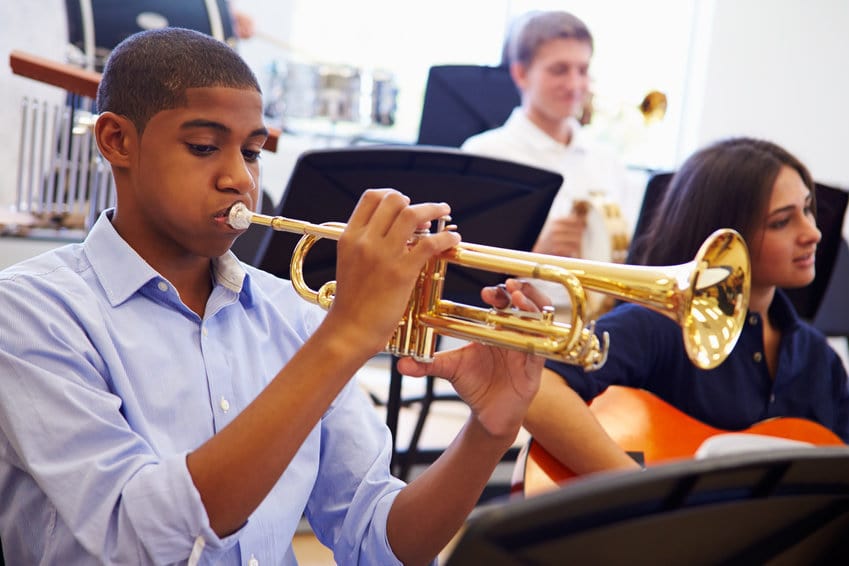Here’s a fact – 75% or more students in US high schools keep aloof of music training (as indicated by a recent research published by US Department of Education). It’s almost worrying how so many young children are missing out on the amazing health benefits of music, despite the availability of better music training infrastructures and access to endless training resources online and offline.
You can make a better choice for your kids; motivate them to learn a musical instrument, help them through their tough learning phases, and help them become better, healthier, and more mature adults. Here are 5 medically proven and science-backed health benefits of music training.

Let Music Control Your Blood Pressure
It’s almost baffling to note that music has the power to hand humans back the control of their erratic blood pressure readings. The idea of listening to appealing music actually transcends the bounds of psychology and has real benefits in terms of lowering blood pressures, bringing them closer to normal. In 2004, researchers at the University of San Diego documented their findings of how several participants reported lower blood pressures after listening to some fantastical classical music.

Four years later, a research published in the Journal of Clinical Nursing mentioned how pregnant women could benefit from music’s surprising property of lowering blood pressure, anxiety, and stress. When made to listen to a CD of classic music hits for half an hour, pregnant women experiences lesser anxiety, depression, and stress. Refer to the study for more detailed results.
Music as a Healer of Pain
Apparently, there’s a lot more than heartache that a good dose of music can cure. In Great Britain, a team of surgeons and doctors was able to reduce the number of painkillers and opiates being given to people who’d undergone stomach surgeries. How did they do it? By replacing some dosage of painkillers with a dose of classical music!
This is just one of the many scientific studies that have indicated towards music’s effectiveness in promoting mental responses that mitigate the sensation and awareness of pain. Another article, highlighting the findings of an extensive study, was published in the Journal for Advanced Nursing, in 2006.
The study involved 60 participants who were assigned to 3 different groups – a patterning music group, a standard music group, and a control group. Patients in the music groups were found to exhibit more power and less pain perception, apart from lower levels of depression, as compared to the control group.
Stronger Emotional Intelligence for Musicians

Philosophers and marvelous writers have talked about music as food for the soul; turns out that men of medicine do not disagree with the rather pompous statements! In 2001, researchers at Southern Methodist University studied the effects of classic music on a group of participants and concluded that after listening to classic music, the participants exhibited better, healthier, and stronger emotions.
Participants were not only more expressive and comprehensive with their communication and comments after the music session, but were also more forthcoming than before. Several other studies have explored the salubrious emotional impact of music and singing education upon ageing adults.
Music Training Means Better Brain Functions
A team of researchers from the University of Vermont has extensively studied the brain scans of more than 200 children, in an attempt to find observable differences in brain functions related to focus, emotional control, and anxiety management.
The findings have been published in the Journal of the American Academy of Child & Adolescent Psychiatry and conclude that students who undergo music training are able to exhibit better stress management, emotional control, and focus than their counterparts. The study focuses on music training and its relations to thickening of the cortex, which itself is closely associated with the brain’s ability to handle depression, control aggression, and sustain attention over appreciably long periods.
Age-Proofing of Language Processing and Auditory Faculties

Ageing brings along deterioration in the functioning of the basic faculties of humans; among these, the ability to recognize sounds and encode auditory stimuli is often among the first ones to be affected by ageing.
In this context, a research conducted at Northwestern University, published in 2012 has some exciting facts and conclusions to present. Researchers studied the auditory and language skills and responses of aged participants and found that musicians were more adept at recognizing sounds and encoding sound stimuli quickly, as well as more accurately doing this as compared to their non-musician and younger counterparts.
Featured Image: Image Credit
nothing makes me happier than the world talking about and celebrating MUSIC ?
— Troye Sivan (@troyesivan) February 15, 2016
Why do we enjoy music so much? The answer is being unlocked in the study of our brains. https://t.co/7jfWHIQujV
— The New York Times (@nytimes) February 15, 2016
Related Articles:
Research Shows the Health Benefits of Music
Scientists are now supporting the claim that Music is Medicine
There are many mindfulness practices to stimulate inner awareness, increase health, and elevate our mood. Now we can add to that list practices such as listening to Mozart with your full being while sipping tea, singing a pop-song out loud while you drive across town, or losing your body to ecstatic dancing. Scientific research now shows us the ways that music has a physiological effect on our bodies and can improve concentration, relieve stress, act as an antidepressant and more. Via Uplift Connect
10 Amazing Proven Health Benefits of Music
Music has been an integral part of human civilization for over 55,000 years and continues to be an important aspect of almost every culture on Earth. It’s so dominant that for many people, their life would be empty without their melodies. At the most basic level, music is just a series of sounds. But research has found it’s much more profound than us hearing noise. Music can have some amazing effects on both your mind and your body. Via TopTenz
Scientists Find 15 Amazing Benefits Of Listening To Music
If you love listening to music, you’re in good company. Charles Darwin once remarked, “If I had my life to live over again, I would have made a rule to read some poetry and listen to some music at least once every week.” Albert Einstein declared, “If I were not a physicist, I would probably be a musician.” Jimi Hendrix called music his “religion.”
I’ve always been in awe of people who can sing and play guitar. As a young girl, I secretly listened to singer-songwriter music in my bedroom into the wee hours. As a rebellious teenager, I cranked rock ‘n’ roll in the house whenever I had to do chores. I always felt great afterwards – now I know why. Via LifeHack

